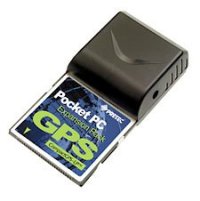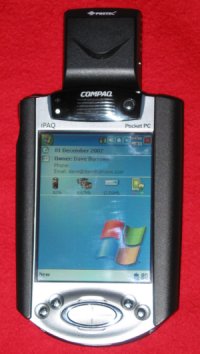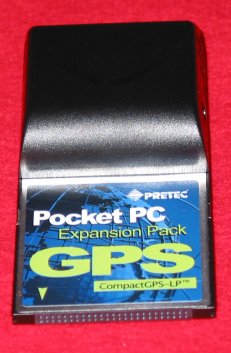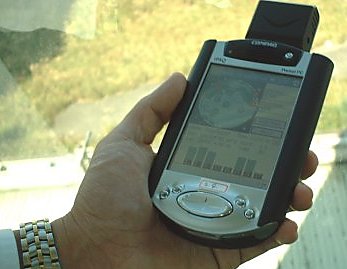|
|
 |
 |
 |
 |
|
Pretec
Compact Flash LP GPS Card Review |
20th December
2002 |
|
|
Reviewed
by: Dave Burrows
Introduction
You may recall back in September 2002 we reviewed
the Pretec CF GPS Receiver. In our tests this came out as quite a good GPS
Receiver, however we couldn't at the time get our hands on the new LP version as it
had only started hitting the stores.
Thanks to Richard at
Jactron, we've managed to
receive the new LP edition (LP stands for Low Power). So why review what
essentially is the same card twice ? The Low Power edition is radically different to the original popular Compact Flash card that Pretec
sells.
One of the main features obviously is it sports a
new Low Power chip. Secondly, it's a soft GPS receiver. Do you
remember a few years ago on the PC, the internal modems started being shipped as
WinModems ? |

Pretec
Box |
|
These were essentially cutting back on physical
chips on the internal modem cards and relying more on PC's memory and processor
from within Windows to drive the modem. |
This is how Pretec have managed to cut power consumption in their new LP design.
By removing some of the main power hogs that are sitting on the circuit board,
and by utilising the Pocket PC's processor and memory enables Pretec to produce a
low power model. Thirdly the LP edition can only support up to 8
satellites at any one time, compared to the usual 12 satellites we now see in
most GPS receivers. Although on an average day, my TTFF's tend to be
around 7-9, I have had higher with 11 on quite a number of occasions. The
more satellite acquisitions it can achieve, in theory the more accurate
triangulation you will see (but this isn't always the case).
When you install the Pretec drivers, you get a GPS
Server driver installed which boots on soft reset of the Pocket PC and displays
on screen trying to detect the Pretec LP card. You can disable this if you
are not going to use the LP card for that session, but the only way of
permanently disabling this on start up is to uninstall it. This is the main
conduit that allows the LP GPS Receiver to be able to communicate and use the
Pocket PC resources.
|

Pretec CF LP GPS Card |
|


 |
|

iPAQ, Pretec CF LP GPS Card
|
Initial Findings and Installation Problems
Unlike the original Pretec card, we had no problem
installing the drivers which came on the LP CD. Luckily and thankfully Pretec have now got this
right, and the drivers on the CD work, and work well once installed.
However there was a beta version 2.03 available, and a 3970 Service Pack available at the
C1 Tech FTP
site. We
have found that the boot-up process on the Pocket PC after completing a soft reset
is extended now due to loading the
GPS Server driver which takes considerably longer and does slow the iPAQ 3850 down.
You can actually watch various parts of the screen re-painting
gradually showing that this is utilising the Pocket PC's processor and memory
quite heavily.
One thing we did find is that each time we started
the Pretec driver to initiate a TTFF, in a cold state (powered off for 4 hours)
it should have had Almanac data but would have no or little accurate Ephemeris data, we still found a TTFF taking around 20-45 minutes. This
was in a clear open sky and not blocked by any objects or having GPS signals
bouncing off of buildings. Knowing full well that most of these receivers
(including the LP) has a backup battery, and that sometimes these do need to be
charged, discharged and re-charged before they'll store Almanac and Ephemeris
data, we left this over
several days to charge it up for a total of 4 hours. This helped immensely and
resulted in some fairly respectable TTFF's. Still 20-45 minutes is a very
long time seeing that Almanac data in theory if received in one piece takes
around 12.5 minutes to receive and Ephemeris data around 30 seconds. One
thing we have noticed, even once Almanac data is stored in the receiver on power
off, is that even on warm/cold starts where as you would normally see a spurt on
most receivers where you'll get 2 or 3 satellites appear within 20 seconds, the Pretec LP does seem to take longer, and we have consistently found that around 1
satellite per minute will be displayed, as it gradually builds up steam.
|
|
Problems Encountered ?
One problem several of our readers have faced is
that running this card on the 3900 series iPAQ's due to the new design and
Bluetooth, initially it does seem to have a problem. Pretec have confirmed
that there is no compatibility issue with the Compaq iPAQ 3900 Series or the
Fujitsu Siemens Loox 600 PDA, providing v2.0 of their drivers are used with the
Loox or v2.3 Beta 1 or above is used with the iPAQ 3900 Series as these versions
will resolve the COM Port issues.
Software Included
Unlike the original Pretec offering, the
Pretec LP no longer comes with AutoRoute 2002, however it does come
with the latest TomTom CityMaps 2003 Edition for the Pocket PC.
Cosmetics
The LP edition is much smaller than the
original Pretec Compact GPS Receiver. This has been partly
achievable from being able to use less circuitry on-board.
|
|
Technical Details
Features:
-
Ultra Low Power
Consumption (under 40mA in running mode)
-
8 parallel
satellite-tracking channels for fast acquisition and reacquisition
-
Support for true
NMEA-0183 data protocol
-
Enhanced
algorithms provide superior tracking performance in urban, canyon,
and foliage environments
-
Maximum navigation
accuracy achievable with the Standard Positioning Service (SPS)
-
Meets rigid shock
and vibration requirements
-
Automatic altitude
hold mode from three-dimensional to two-dimensional navigation
-
Automatic cold
start acquisition process
-
Built-in Antenna
-
Data retention
with Li-Ion battery inside
-
Reversed straight
MMCX subminiature, snap-on, coaxial RF jack receptacle
-
CFA compliant
Dimensions:
|

Pretec LP's Compact Size |
|
Reacquisition:
-
Hot Start:
20 sec,
average
-
Warm Start: 45 sec,
average
-
Cold Start:
130sec,
average
Protocols:
-
NMEA 0183 v2.2,
GGA, GSA, RMC once per second. GSV once per 5 seconds. Baud rate is
4800bps, 8 data bit, no parity bit, 1 stop bit.
Operating System:
-
Currently only
compatible with Pocket PC's running the ARM and XScale processors
(such as iPAQ 3600-3900 Series, HP Jornada 560 Series, Casio E-200,
Toshiba e540 etc)
|
|
Compaq iPAQ 3970 Test
This test
was performed by Pretec themselves using the GPS drivers v2.4.
This shows a 5 satellite fix on a Compaq iPAQ 3970.
|
 |
-
Platform:IPAQ 3970+ CF slot
Jacket,without connecting to EXTERNAL antenna
-
GPS receiver: GPS-LP
-
Test environment: Beside the window,8F,
-
Result: More than 5 satellites can be fixed.
-
Date/Time: Dec/17/2002,
-
11:50AM(Taiwan Local Taiwan)
-
Test Location: Taoyuan Hsien,Taiwan.
-
Test software: GPS-monitor
-
Software version:Ver2.4
|
If
you still find that on a Compaq 3900 Series iPAQ that the Pretec LP
card still does not function, you will need to dive into the
registry and make the following change. Please note it's
always best to backup the Pocket PC and registry before making any
of these changes.
1) On
Pocket PC, goto Explorer and navigate to
My Device\Programfiles\Pretec\CompactGPS-LP folder,
and execute GPS-LP2.4 SP1.exe
2) A message box will pop up, and click “Yes” to install patch file
for IPAQ 3970 PDA.
(This patch file will remove IPAQ consumer IR UART)
4) Double click GPS_Server
Update 23-Dec-2002
I've
had a note back from our friend Enrico Pappolla over at
PocketPC Italia who has
tried the instructions above and this has resolved the problem in
getting the LP to work on a 3970.
|
|
Latest Driver
Versions
In writing this review, the drivers
had reached version 2.4 Beta 2. These can be downloaded from the
C1 Tech FTP site at
ftp://coneguest:@ftp.c1tech.com.tw/FAE_Support and we have a link
direct to this in our downloads page.
|
|
Final Thought
We found the Pretec LP GPS Receiver
to be slower in initial acquisition time compared to many of the GPS
receivers we have tested in the past, and where we would normally see
a 7-9 satellite fix on a 12 sat receiver, we were finding around 4-6
on average with the Pretec LP. In general once over the initial
teething problems, we found it to be a
good receiver, although there were some canyon effects, these weren't
as bad as we had expected and the receiver did receive a constant fix
most of the time. When a fix was lost, the receiver took around
5 seconds for re-acquisition which is quite good. If you're starting out in the world of Global
Positioning Systems for the Pocket PC, and are looking to keep costs
down or are looking for a low power consumption which gives you full
mobility to go where you want giving you better battery performance,
then the Pretec LP is probably for you.
One thing to bear in mind is that although the manufacturer TTFF's
quoted are pretty standard, we found the TTFF's to be slower than
advertised and slower in comparison to other Pocket PC GPS Receivers
we tested,
although TTFF's aren't everything. However Pretec do say a way
to speed up the slow TTFF's is to use the external optional antenna
with the Pretec LP card.
Purchase from

|
|
References
|
|
|
Manufacturers Website
|
http://www.pretec.com
|
|
Suppliers Website |
http://www.jactron.co.uk |
|
Pocket GPS Reviewer
|
Dave Burrows |
|
Pocket GPS Reviewer Website |
Dave Burrows.com |
|
|
|
|
Rating
|
|
|
Durability |
          |
|
Windscreen Suction Mount Strength |
Not Supplied |
|
Air Vent Mount Strength |
Not Supplied |
|
Car Power Cable Quality |
Not Supplied |
|
|
|
|
Overall Rating 70% |
          |
|
How did we achieve these ratings ?
|
Review Ratings |
|
|
 |
 |
 |
 |
|
|